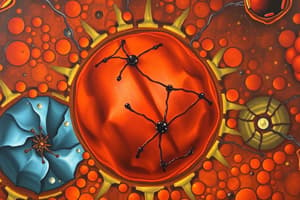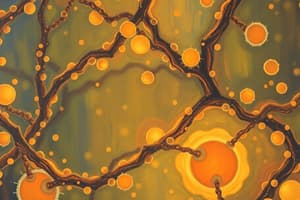Podcast
Questions and Answers
What is the process of breaking down complex molecules into simpler ones, releasing energy?
What is the process of breaking down complex molecules into simpler ones, releasing energy?
- Catabolism (correct)
- Electron Transport Chain
- Anabolism
- Glycolysis
What is the primary function of enzymes in metabolic processes?
What is the primary function of enzymes in metabolic processes?
- To regulate hormonal imbalances
- To speed up metabolic reactions (correct)
- To synthesize proteins
- To generate ATP
Which metabolic pathway is responsible for the breakdown of glucose into pyruvate?
Which metabolic pathway is responsible for the breakdown of glucose into pyruvate?
- Citric Acid Cycle
- Electron Transport Chain
- Fatty Acid Oxidation
- Glycolysis (correct)
What is the term for the assembly of amino acids into proteins?
What is the term for the assembly of amino acids into proteins?
What is the factor that influences metabolic rate and efficiency, based on inherited traits?
What is the factor that influences metabolic rate and efficiency, based on inherited traits?
What is the term for the generation of ATP from NADH and FADH2?
What is the term for the generation of ATP from NADH and FADH2?
Flashcards are hidden until you start studying
Study Notes
Definition and Overview
- Metabolism: the process by which the body converts food into energy and the necessary building blocks for growth, maintenance, and repair
- Involves a series of chemical reactions that occur within cells to sustain life
Types of Metabolism
- Catabolism: breakdown of complex molecules into simpler ones, releasing energy (e.g., digestion, cellular respiration)
- Anabolism: synthesis of complex molecules from simpler ones, requiring energy (e.g., protein synthesis, glycogen synthesis)
Metabolic Pathways
- Glycolysis: breakdown of glucose into pyruvate, producing ATP and NADH
- Citric Acid Cycle (Krebs Cycle): breakdown of acetyl-CoA into ATP, NADH, and FADH2
- Electron Transport Chain: generation of ATP from NADH and FADH2
- Fatty Acid Oxidation: breakdown of fatty acids into acetyl-CoA, producing ATP and NADH
- Protein Synthesis: assembly of amino acids into proteins
Key Players
- Enzymes: biological catalysts that speed up metabolic reactions
- Hormones: chemical messengers that regulate metabolic processes (e.g., insulin, glucagon)
- Coenzymes: molecules that assist enzymes in catalyzing reactions (e.g., NAD+, FAD)
Factors Affecting Metabolism
- Genetics: inherited traits that influence metabolic rate and efficiency
- Diet: composition and quantity of food intake affect metabolic processes
- Exercise: regular physical activity can increase metabolic rate and efficiency
- Hormonal Imbalances: hormonal changes can impact metabolic processes (e.g., thyroid disorders)
- Age: metabolic rate tends to decrease with age
Studying That Suits You
Use AI to generate personalized quizzes and flashcards to suit your learning preferences.




